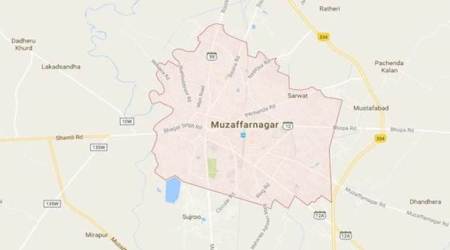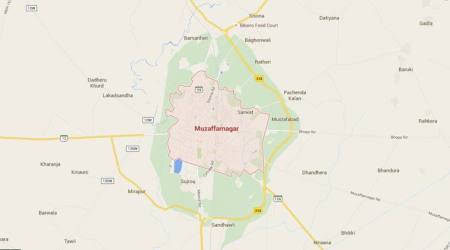 Singh, whose house the train crashed into, came to the colony in 1974. (Express Photo by Praveen Khanna)
Singh, whose house the train crashed into, came to the colony in 1974. (Express Photo by Praveen Khanna)
Most evenings, Jagat Singh, 70, and his friends would sit by the raiway tracks — on stools and chairs — and sip tea. Their conversations would be punctuated with loud honks, followed by the rhythmic chug, of trains that went past them. Today, as Singh sits nursing a fractured leg — less than a week after the Utkal Express crashed into his home in Khatauli, in Uttar Pradesh’s Muzaffarnagar district — that rhythm stands disrupted.
However, Singh and the others who live in the colony are determined to get their lives back on track, says his son Pintu Chaudhary, sitting beside his father who is receiving a steady stream of visitors.
It was in 1974 that Singh bought land along the tracks and started building homes — for himself and his extended family. Over the years, as families grew and drifted apart, some of these homes were partitioned and others sold off, and the area took on the name of the patriarch — Jagat Colony.
Jagat Colony is 300 metres from Khatauli station and close to 35 trains run on the single track. On the same side of the track as the Singh household are a few shops, some more homes, a private school with classes from 6 to 12 and a tehsil office. Behind the Singh household are more homes and a market.
“My father says that in those days, the track was at least 60 metres away,” says Chaudhary, a businessman, adding that over the years, as homes expanded, the rails came closer — they are now merely 30 metres away.
Chaudhary says that for the hundreds of residents of the area, their daily interactions and activities are intrinsically linked to the railway track. Most of the small grocers and shops, from where they buy milk and bread and other daily necessities, are across the rails. In the absence of an effective waste management system, the colony dumps its garbage on the other side of the tracks.
Chaudhary’s wife Poonam says, “The train has become a part of our lives. We don’t even think about it.” Just then, a passenger train passes by on the track outside, its horn blaring, but Poonam doesn’t seem to notice and talks right through it. “We have to cross the track if we have to buy something from the market on the other side. There is another market behind our colony but the one across the track is easier to get to. I remember how, when I got married, I couldn’t sleep properly for at least a month. Whenever a train passed, I would wake up with a jolt. Now, I don’t even notice it. We tell our two children to stay away from the tracks but where do they listen?”
In the school down the tracks, sociology teacher Arun Sharma says that in his 28 years here, he has never witnessed an accident. “When I started teaching here, I took a room on rent close to the school. At nights, I wouldn’t be able to sleep because of the noise and I would count the number of trains that passed by. There was a gap of a few hours at night and that’s when I fell asleep.”
As life slowly returns to normal in Jagat Colony, reminders of the accident are strewn everywhere — sheets of metal, springs, tiffin boxes, shoes and clothes.
Back at Jagat Singh’s home, it’s time for lunch and Chaudhary makes his way past some of the rubble to enter the house. After last week’s accident, which left 23 dead and 156 injured, will life by the track ever be the same? Chaudhary dismisses such concerns with a wave of his hand.
“It is possible, isn’t it, for an aeroplane to fall from the sky and land on your house? It is also possible that if you live along a busy road, a truck might lose control and crash into your house. This is our house, where else do we go?” he says.

